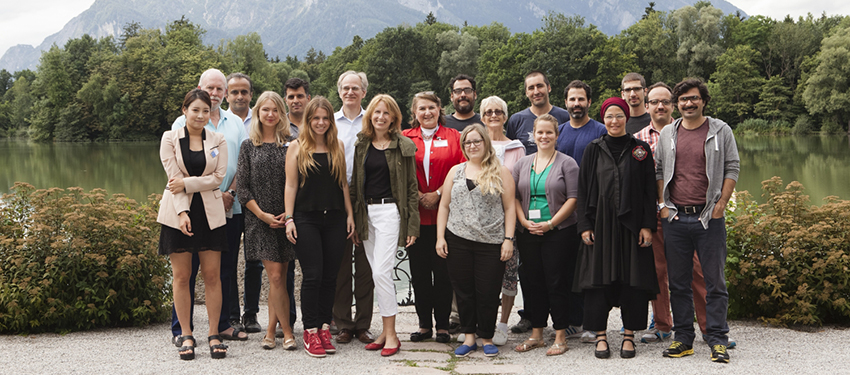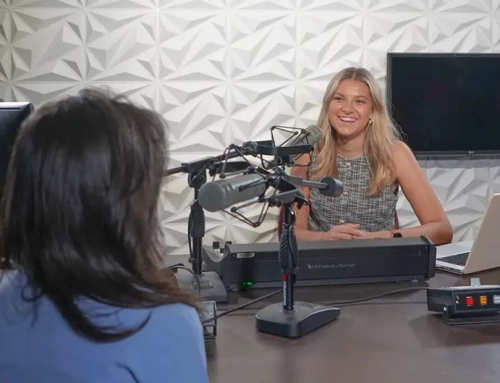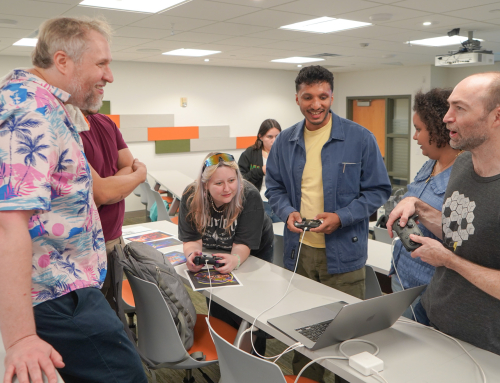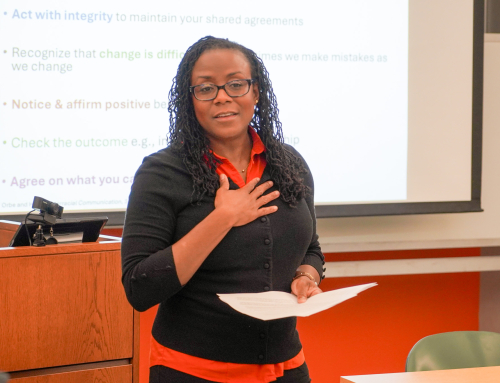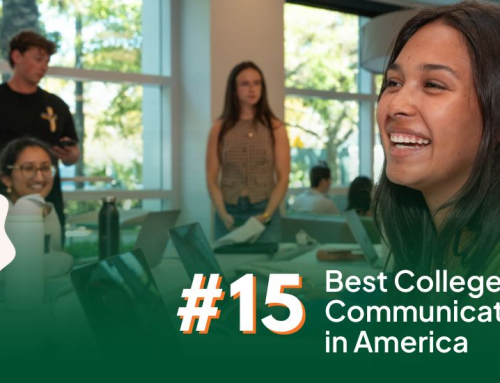Seventy-six students from 20 countries on five continents came together with three major global partners in Salzburg, Austria this month with one shared goal: to discover how digital media can tackle issues of both local and global concern.
The international cohort of the Salzburg Academy on Media and Global Change, together with the United Nations Development Program (UNDP), the Red Cross Red Crescent Climate Centre and Global Voices, and led by academic, development and media experts, sought to develop innovative media tools to better understand media literacy and address challenges from climate change to women rights.
Now in its ninth year, the Salzburg Academy began in 2007 as a partnership between Salzburg Global Seminar and the International Center for Media and the Public Agenda at the University of Maryland. This partnership has now expanded to include universities from across the world, including the University of Miami, as well as international media and development organizations.
Graduate student Xiao Fang from the University of Miami was selected to take part in the 2015 program.
During the three week program at Schloss Leopoldskron, home of Salzburg Global Seminar, the students participated in skill-enhancing workshops and intense small group discussions; attended expert-led lectures; and ultimately developed case studies, innovative strategies, and media tools with the goal of creating real life impact in their local and global communities.
Building on last year’s work with the UNDP’s Knowledge, Innovation and Capacity Group (KICG), the 2015 program – Civic Voices: Justice, Rights and Social Change – engaged another two international groups: the Red Cross Red Crescent Climate Centre and Global Voices. The three partners presented the students with a specific challenge for which they had three weeks to develop media-based solutions: empower women, improve community resilience to climate change-induced disasters, and increase civic engagement through enhanced technology and online communities.
The program was led by a keynote speech from Lucio Mesquita, director of BBC Monitoring, on Monitoring the News and the Challenges News Providers Face in Digital Era, as well as lectures from representatives of each partner organization. Margot Steenbergen, a program officer from the Climate Centre, conducted a gaming workshop with students to help them understand the value of games in creating awareness about complex issues like climate change. Maya Morsy, regional gender team leader for the UNDP Regional Bureau of Arab States in Egypt, discussed the role media can play in empowering women through better representation. Ivan Sigal, executive director at Global Voices, discussed the power of the internet and online media in reaching communities underrepresented in mass media and increasing civic engagement.
Faculty from partner universities, including Sanjeev Chatterjee, award-winning film maker and professor at the School of Communication at University of Miami, guided the students as they worked in small groups critically analyzing the three problems presented to them and developing in-depth case studies that reflected the issues of climate change, women’s rights and lack of online resources on a global scale and the role media can play in countering them.
Case studies done by students presented diverse innovative solutions to issues like gender inequality within the media industry, promoting marginal communities online, and building community resilience:
Empowered by Art: Breaking gender stereotypes
I Survived Because: Resilience through Preparedness
Books on Board: Bringing Education to Girls
In addition to lectures and workshops, the students were also treated to the world premiere of long-serving faculty member Roman Gerodimos’s short films At the Edge of the Present, a short film on “urban coexistence,” as well as an advance preview of the forthcoming film A Certain Type of Freedom, which focuses on youth and the city. Students also worked in teams to produce their own videos, led by award-winning documentary makers Sanjeev Chatterjee and Rhys Daunic.
These videos have now been collected into a “mosaic” showcasing their three weeks’ work, http://salzburgacademy.org/.
Students also worked on individual videos for their case studies:
Empowered by Art: Breaking gender stereotypes
I Survived Because: Resilience through Preparedness
My Voice: Margialized communities breaking stereotypes
All participants took part in a weekly photo contest with themes “I share therefore I am,” “Never mistake motion for action” and “All change comes from inside.” Outside of lecture halls and seminar rooms, students also got a chance to travel to the Mauthausen Memorial, the site of the former Nazi concentration camp.
Xiao Fang, a recent graduate from the University of Miami School of Communication was encouraged by her professor Sanjeev Chatterjee to apply for the three week program. “If I was not here, I would have never got a chance to make friends with people from Africa, from U.S., from Europe or from Middle East.”
According to Fang, this is a good program for more students to apply for “because you will get a chance to meet people you probably would never meet. You will also get a chance to learn about the issues all around the world and there are several different perspectives that you would never think about.”
Fang hopes to carry the lessons she learned in to her future work and to also stay connected with the network she built at the academy.
As it has been from the start, the Salzburg Academy is not just “on Media” but also “Global Change,” and in the words of famed anthropologist Margaret Mead, chair of the first ever session of Salzburg Global Seminar: “Never doubt that a small group of thoughtful, committed citizens can change the world; indeed, it’s the only thing that ever has.”
About the Salzburg Academy on Media and Global Change
The Salzburg Academy on Media and Global Change was founded in 2007 as collaboration between Salzburg Global Seminar and the International Center for Media and the Public Agenda at the University of Maryland. It is now a multi-dimensional initiative that provides curricular materials, training and support for journalism schools, programs and classrooms across the world. It is organized through a network of participating universities in China, East Africa, the Middle East, Eastern Europe, the UK, Latin and North America, and brings together expert faculty and around 70 students, from undergraduate to Ph.D level, each summer for a three week summer program.
Participating universities this year were: American University of Beirut, Lebanon; Bournemouth University, UK; Daystar University, Kenya; Jordan Media Institute, Jordan; Emerson College, MA, USA; Iberoamericana University, Mexico; Pontificia Universidad Catolica, Argentina; St. Pölten University of Applied Sciences, Austria; Chinese University of Hong Kong; University of Maryland – College Park, MD, USA; University of Miami, FL, USA; University of Rhode Island, RI, USA; University of St Cyril and Methodius, Slovakia; and University of Texas at Austin, TX, USA.
You can read more about the Salzburg Academy on Media and Global Change online at: http://media-academy.salzburgglobal.org
About Salzburg Global Seminar
Founded in 1947, Salzburg Global Seminar is based at Schloss Leopoldskron in Salzburg, Austria. Salzburg Global’s mission is “to challenge present and future leaders to solve issues of global concern.” The program strategy – focused on Imagination, Sustainability and Justice – is guided by its commitment to tackle systems challenges critical for future generations and to engage new voices to “re-imagine the possible.”
Education for global citizenship and change was at the center of Salzburg Global’s visionary goal when it was founded by three young Harvard students at the end of World War II (as the Salzburg Seminar in American Studies). The international non-profit was founded on the notion of bringing young leaders together to broaden their understanding about the factors, forces and systems that shape the world in which they live, in order to equip them with the impetus to create more lasting, sustainable, and peaceful societies. Almost 70 years later, this noble vision still drives Salzburg Global’s work and it is at the heart of all of Salzburg Global’s programs.
In addition to its Academies program, Salzburg Global also runs programs for established and emerging leaders covering critical issues in education, health, environment, economics, governance, peace-building and more.
You can read more about Salzburg Global Seminar online at: www.salzburgglobal.org

